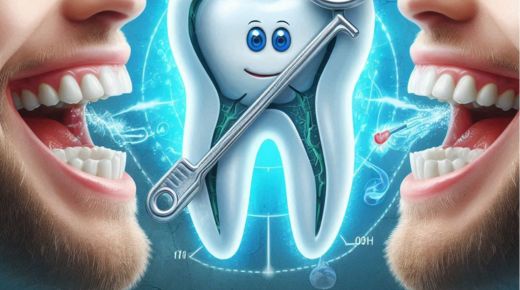Fluoride, a naturally occurring mineral, has revolutionized oral healthcare by playing a pivotal role in strengthening teeth enamel. For decades, fluoride has been recognized as a crucial component in the prevention and treatment of tooth decay and cavities. By integrating into the tooth enamel’s structure, fluoride enhances its density and hardness, rendering it more resistant to acid attacks and wear. This essential mineral has been proven to reverse the early stages of tooth decay, reduce tooth sensitivity, and prevent gum disease. With its widespread use in toothpaste, mouthwash, and professional dental treatments offered by dentist in Englewood, NJ, fluoride has become an indispensable tool in maintaining optimal oral health.
This article will delve into the mechanisms by which fluoride strengthens teeth enamel, exploring its types, and benefits of treatments.
What is fluoride?
Fluoride is a naturally occurring mineral found in water, soil, and some foods. It’s also synthesized for use in various products, including toothpaste, mouthwash, and professional dental treatments.
Types of fluoride treatments:
- Topical fluoride: Applied directly to teeth, typically through toothpaste, mouthwash, or professional varnishes.
- Systemic fluoride: Ingested through fluoridated water, supplements, or foods.
- Professional fluoride Treatments: Dental office applications, such as gel or foam treatments.
How does fluoride strengthen tooth enamel?
Fluoride works through several mechanisms to fortify teeth enamel:
- Remineralization: Fluoride replenishes calcium and phosphate ions, reversing the early stages of tooth decay.
- Acid resistance: Fluoride helps enamel resist acid attacks from plaque bacteria and sugars.
- Enamel hardening: Fluoride is incorporated into the enamel’s structure, increasing its density and hardness.
- Hydroxyapatite formation: Fluoride promotes the formation of hydroxyapatite, a key mineral component of enamel.
- Inhibition of demineralization: Fluoride prevents acid-mediated demineralization, reducing enamel loss.
- Enhancement of enamel’s crystal structure: Fluoride rearranges enamel’s crystal structure, making it more resistant to decay.
What benefits does fluoride offer?
Fluoride offers the following benefits:
Primary Benefits
- Prevents Tooth Decay and Cavities
- Strengthens Tooth Enamel
- Reduces Tooth Sensitivity
- Reverses Early Stages of Tooth Decay
- Prevents Gum Disease
Additional Benefits
- Improves Oral Health
- Boosts Confidence in Smile
- Reduces Risk of Tooth Loss
- Decreases Need for Fillings and Restorations
- Enhances Overall Health
Specific Benefits for
Children
- Develops Stronger Teeth
- Prevents Childhood Cavities
- Promotes Healthy Oral Habits
- Reduces Risk of Orthodontic Issues
- Enhances Oral Development
Adults
- Maintains Oral Health
- Prevents Adult-Onset Cavities
- Reduces Tooth Sensitivity
- Helps Manage Gum Disease
- Enhances Smile Aesthetics
Long-Term Benefits
- Lifelong Oral Health
- Reduced Risk of Systemic Diseases (e.g., Heart Disease)
- Improved Quality of Life
- Enhanced Self-Esteem
- Reduced Healthcare Costs
Who can benefit from fluorides?
Fluorides can benefit various individuals, including:
Children
- Infants and toddlers (0-3 years): Prevents early childhood cavities.
- Preschoolers (4-5 years): Strengthens developing teeth.
- School-age children (6-12 years): Prevents cavities and promotes oral health.
Adults
- Young adults (18-39 years): Maintains oral health, and prevents adult-onset cavities.
- Middle-aged adults (40-64 years): Manages gum disease, tooth sensitivity.
- Older adults (65+ years): Prevents root cavities, and dry mouth.
High-Risk Individuals
- Patients with a history of cavities or gum disease.
- Those with inadequate oral hygiene habits.
- Individuals with medical conditions (e.g., diabetes, heart disease).
- Pregnant women.
- Smokers.
Special Needs Populations
- Individuals with developmental disabilities.
- Those with orthodontic appliances.
- Patients with oral appliances (e.g., dentures).
- Individuals with dry mouth (xerostomia).
Professions with High Oral Health Risks
- Athletes (contact sports).
- Musicians (wind instruments).
- Individuals with high-sugar diets.
- People working in acidic environments.
Takeaway
Fluorides play a vital role in strengthening tooth enamel and safeguarding teeth against decay and damage. Through its multifaceted mechanisms, fluoride reverses early stages of tooth decay, enhances enamel density and hardness, and prevents acid-mediated demineralization. The benefits of fluoride are far-reaching, extending to individuals of all ages, from children to adults, and encompassing various oral health needs. By incorporating fluoride into oral hygiene routines, individuals can significantly reduce the risk of cavities, tooth sensitivity, and gum disease.

